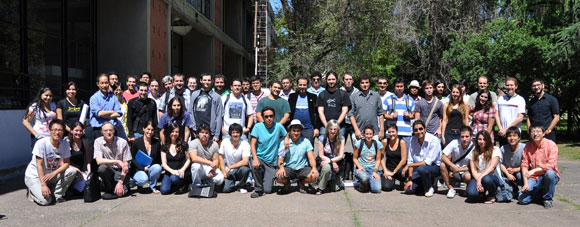PASI2012 - Exploring the Terascale and Beyond
Marleigh Sheaff

The University of Buenos Aires played host to this Pan-American Advanced Studies Institute from March 5 through March 16 of this year. The three frontiers along which particle physics must advance in order to answer the many questions still outstanding in this field, the Energy, Intensity, and Cosmic Frontiers, provided the theme for the multidisciplinary program. While the fields of particle physics and cosmology could be treated as separate fields some twenty years ago, it is clear by now that they are closely intertwined and advances in either one inform the other.
Thirty-two post docs and advanced graduate students, eighteen from institutions in the United States and thirteen from institutions in five countries in Latin America participated through an award made by the PASI program supported jointly by the National Science Foundation and the Department of Energy. The PASI award leveraged additional support from Brazil, Chile, and Argentina that allowed an additional 42 students from those countries to take advantage of this unique educational opportunity. The student participants from all countries were outstanding, which made for a very worthwhile and intellectually stimulating activity. Approximately half of the advanced graduate students who participated were local, which reflects the high-quality of particle physics education in Argentina.
The international organizers, most of whom lectured at the institute, came from the U.S. and three different countries in the Southern Hemisphere. The U.S. members were Marleigh Sheaff, Chair, and Daniel Chung, both of the University of Wisconsin-Madison, and Marcela Carena of Fermilab and the University of Chicago. They were assisted by three professors from Latin America, Gustavo Burdman of the University of Sao Paulo in Brazil, Marco Aurelio Diaz of the Catholic University in Santiago, Chile, and Daniel de Florian of the University of Buenos Aires. De Florian also acted as chair of the local organizing committee.
The lecture courses covered a broad range of topics on three frontiers:
Energy Frontier- Kirill Melnikov, Johns Hopkins University, Quantum Chromodynamics
- Sekhar Chivukula, Michigan State University, The Quest for Electroweak Symmetry Breaking
- Elizabeth Simmons, Michigan State University, Strong Dynamics
- Aurelio Diaz, Catholic University in Santiago, Chili, Higgs Physics at Colliders
- Cecilia Gerber, University of Illinois - Chicago, Experimental Methods in Hadron Colliders
- Marcela Carena, Fermilab, Supersymmetry
- Gustavo Burdman, University of Sao Paulo, Brazil, Extra Dimensions
- Boris Kayser, Fermilab, and Renata Zukanovich Funchal, University of Sao Paulo, gave an interleaved set of lectures on Neutrinos - Theory and Phenomenology
- Andre de Gouvea, Northwestern University, Fundamental Physics with Muons and Related Topics
- Daniel Chung, University of Wisconsin, Introduction to Cosmology
- Leonardo Senatore, Stanford University, Inflation, CMB
- Graciela Gelmini, University of California - Los Angeles, Astroparticle Physics - Dark Matter.
In addition to this advanced series of multidisciplinary lecture courses augmented by discussion sessions at which the students could clarify their understanding through detailed answers to their questions, there were many student talks and posters as well as a special one-day session highlighting experiments sited in Latin America. The full program can be viewed on the PASI2012 web site.
The PASI award provided support for all lecturers including Arnulfo Zepeda of CINVESTAV, Mexico City, who gave the keynote address at the special one-day session.
Zepeda is a member of two of the three experiments highlighted in this program, AUGER (Argentina), DES(Chile), and HAWC(Mexico). Special thanks are due to the physicists who volunteered their time to present detailed seminars on the experiments:- Carola Dobrigkeit of UNICAMP, Brazil, Recent Results from the Pierre Auger Observatory
- Federico Sanchez, ITeDA and CNEA, Argentina, Non-Thermal Cosmic Messenger Experiments: Auger, CTA, ANDES
- Martin Makler, CBPF and LIneA, Brazil, Mapping the Universe: the Dark Energy Survey, Status and Plans
- Miguel Mostafa, Colorado State University, The High Altitude Water Cerenkov Observatory
The special session included a presentation by Sergio Novaes on collaborations between Brazil and other countries, many of them outside of Latin America, entitled Brazil and the LHC: A Personal Perspective. His presentation gave many details, including a list of collaborations of the various institutions in Brazil with others world-wide on all four experiments at the Large Hadron Collider at CERN. He also discussed how collaboration in particle physics has leveraged support in Sao Paulo State for a wide-ranging computer grid extending to the institutions of higher learning throughout the state, which is available for research in all the sciences.
Carlos Garcia Canal, a well known Argentine particle theorist from the National University in La Plata, organized a round table on Collaborations as a wrap-up of the day's activities. Two U.S. students gave short presentations at this round table. Both had applied for and been awarded grants that allowed them to travel to Latin America to work with colleagues there. Amanda Yoho, a graduate student at Case Western Reserve in Cleveland, traveled to Brazil for a short-term visit, Zigried Hampel-Arias, a graduate student at the University of Wisconsin, obtained a Fulbright fellowship that supported him to work for one year in Argentina on the Auger experiment with the group in Bariloche. A major discussion point at the round table was the stated wish of all who took part for a consistent source of funding for scientific research.
Marleigh Sheaff is a Senior Scientist Emeritus in the Physics Department at the University of Wisconsin.
Disclaimer - The articles and opinion pieces found in this issue of the APS Forum on International Physics Newsletter are not peer refereed and represent solely the views of the authors and not necessarily the views of the APS.
